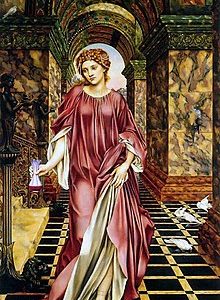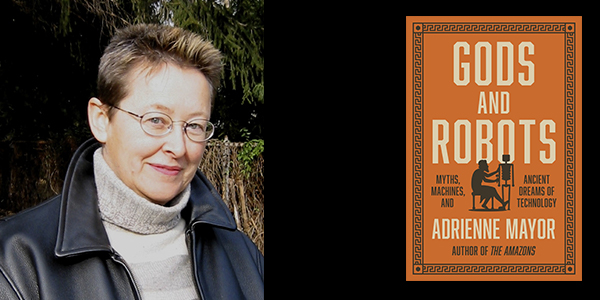The first robot to walk the earth was a bronze giant called Talos. This wondrous machine was created not by MIT Robotics Lab, but by Hephaestus, the Greek god of invention.
On 12/3, Town Hall will present Adrienne Mayor, Research Scholar at Stanford University, to discuss her new book, Gods and Robots. We’re delighted to bring her to the stage for a first look at the ancient origins of humanity’s timeless impulse to create artificial life. To offer us a preview of her upcoming event, Mayor recently sat down with Town Hall’s Jonathan Shipley to discuss automatons, Medea, and Siri.
JS: How did you first get interested in classics and folklore?
AM: You might say I’m a historian of human curiosity—I’m interested in uncovering historical and scientific knowledge embedded in ancient mythology, legends, and folklore. Much of my work takes place in the borderlands where classical Greek and Roman literature and art meet archaeology, history, anthropology, and science. What I am seeking are the earliest inklings of the scientific impulse in premodern cultures.
JS: What inspired you to combine that interest with robots and AI?
AM: I live in Silicon Valley where brilliant innovators are exploring and producing ways to imitate, improve, and surpass nature, developing Artificial Intelligence, advanced robotics, and other marvels. So I was curious—who first imagined automatons? How deep are the roots of the human desire to make artificial life? Most historians trace the first working automatons to the Middle Ages. But I wondered, could the ideas of making self-moving devices and androids have been imagined long before the technology made them feasible? I found compelling evidence that the concepts of making artificial life were thinkable as early as the time of Homer, in myths first written down in about 700 BC.
JS: To avoid confusion, how do you define a robot? An automaton? Artificial intelligence?
AM: Robot and automaton are interchangeable in informal speech. But a glossary of technical terms is included in Gods and Robots. An automaton is a self-moving mechanical or constructed device resembling an animal or a human. Some automatons perform tasks according to predetermined instructions and some respond to different circumstances. Artificial Intelligence mimics cognitive functions associated with intellect or mind, such as learning, planning, and problem solving; there are complex categories of “narrow” and “general” AI and four ascending types of AI. Robot is a slippery term but usually means a machine or self-moving object with a power source; some robots can be programmed to sense surroundings and process data to interact with the environment and perform actions.
JS: When writing the book, what parallels between the ancient and modern world struck you most about our human want/fear/need/desire/etc of technology?
AM: It is striking that the ancient myths about the god of invention Hephaestus, the techno-wizard Medea, the fire-bringer Prometheus, and the legendary craftsman Daedalus are really the first-ever science fiction tales. The ancient stories and art works show how the power of imagination allowed people more than 2,500 years ago to ponder how one might create driverless carts, self-navigating ships, and bronze killer robots—if only one possessed the sublime technology and genius of the gods. It is often remarked that where science fiction leads, inventions often follow. And indeed, by the fourth and third centuries BC, a profusion of genuine self-moving devices, animated statues, and automated machines were being designed and built.

Hephaestus, god of metalworking.

Medea, granddaughter of Helios, the sun god.

Prometheus, giver of fire to humanity.
JS: What ethical conundrums did the ancients face in regards to robots/technology/etc?
AM: The myths suggest that as long as the self-driving chariots, golden servant-androids, and automatic machines fabricated by Hephaestus are confined to the realm of the gods, they are charming and benign. But when automatons like the bronze robot Talos and the artificial woman Pandora are sent to earth and interact with humans, then all kinds of troubles are unleashed. Today many warn that technology favors tyranny. Notably, that ethical concern appeared in both ancient myth and in historical times and places: there was a strong link between autocratic rulers and machines of malice.
JS: What’s your favorite mythological story in regards to artificial life? Why? What can it teach us today?
AM: The myth of Pandora is my favorite. She was created as ‘evil disguised as beauty,’ to punish humans for accepting the gift of divine fire, stolen by Prometheus. Zeus ordered Hephaestus to fabricate a seductive femme fatale android ‘programmed’ to open sealed jar of eternal misery for humankind. The story has so many layers of meaning. A cruel and vindictive tyrant, Zeus jealously guarded his divine technology of fire and commissioned an evil fembot as revenge. Prometheus, whose name means ‘foresight,’ tried to warn mortals against accepting Pandora, but her deceptive charms were dazzling. Today, Pandora’s box is often compared to the allure of the ‘gifts’ of AI and robotics. Even the last thing in the fateful jar, Hope, has a double meaning. Philosophers since antiquity have debated whether Hope was the best or worst thing in the jar.
JS: If you were to make a robot, what would you name it? What would you want it to do?
AM: Great question, but ironic for me! I own a smartphone but I have no smart appliances and I never talk to Siri or Alexa. I prefer cars with few automatic features—I like to roll down my own windows and I use printed road maps instead of GPS navigation devices. I’m unlikely to interact knowingly with a robot and can’t think of anything I’d want a personal robot to do.
As for robot names, Tik-Tok is my favorite because it designates the extreme poles of robotics for good and evil. The original Tik-Tok was the rotund and genial mechanical clockwork servant in Frank Baum’s popular Oz books (1907). By 1983, his namesake has become a psychopath robot bent on getting away with murder in John Sladek’s chilling sci-fi novel Tik-Tok.
Don’t miss Adrienne Mayor’s event on 12/3 at Pigott Auditorium at Seattle University.


